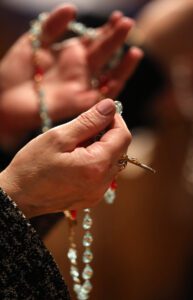(OSV News) – After traveling the United States for 10 months during 1831-32, French diplomat and political philosopher Alexis de Tocqueville declared in his classic work “Democracy in America” that “there is no country in the world where the Christian religion retains a greater influence over the souls of men than in America.”

But almost 200 years later, a new report from the Public Religion Research Institute (PRRI) titled “Religion and Congregations in a Time of Social and Political Upheaval” casts a shadow of doubt on the fervor of Americans, only 16% of whom reported to PRRI that religion is the most important thing in their lives.
In PRRI’s study, those with no religious affiliation represented 27% of the population. Likewise a majority of Americans either seldom (28%) or never (29%) attend religious services; and more than one-third (37%) of those who exited a religion identified themselves as “former” Catholics.
“One of the meta trends in the American religious landscape over the last 20 — even 30 — years has been the precipitous decline in religious affiliation and a decline in other indications of religiosity,” said David Campbell, the Packey J. Dee Professor of American Democracy at the University of Notre Dame in South Bend, Indiana. While there is some debate about underlying reasons, “research that I and others have done has demonstrated that America does seem to be secularizing in a way that it had not previously,” Campbell explained.
For context, Campbell said almost since “the beginning of public opinion polling – going back many, many decades up until roughly 1990 – no more than 5% of Americans ever said they had no religious affiliation. And then in the last 30 or so years, you’ve seen this dramatic rise in religious non-affiliation that’s now been accompanied by other indications that people are less and less religious.”
“The piece of folks not affiliating or identifying with particular religious traditions or churches – that’s been going on for decades,” agreed Jesuit Father Thomas Gaunt, executive director of the Center for Applied Research in the Apostolate (CARA), a research center at Georgetown University that conducts social scientific studies for and about the Catholic Church.
Father Gaunt noted, however, a distinction between institutional membership and belief. “These are people who believe in God,” he said. “They just don’t necessarily believe in institutional churches.”
“Fifty years ago, it would just be unusual for someone to say they didn’t belong to any church body. The social mores have changed — and so that’s not as startling or as unacceptable socially,” said Father Gaunt. “It may be those who said, ‘Oh, yeah — I’m a Catholic,’ or ‘I’m a Baptist,’ 40 years ago didn’t really mean that, but today they feel more comfortable acknowledging that.” This phenomenon – known as social desirability bias – can skew poll data.
Within the Catholic Church in the U.S., Father Gaunt noted “explosive” growth in the South and West of the country, primarily due to relocation; immigration also has had an impact.
“When you’re in the Northeast and Midwest and you’re looking at an empty church, that’s just kind of hard to comprehend – but that is the reality in so many places,” he said, noting that the Archdiocese of Atlanta added a million Catholics to its membership rolls over the last 30 years.
Weekly Mass attendance also has, Father Gaunt reported, almost returned to pre-COVID levels.
“I think there is a paradox here,” said John Carr, founder of the Initiative on Catholic Social Thought and Public Life at Georgetown University. Carr served for over 20 years as director of the Department of Justice, Peace and Human Development at the U.S. Conference of Catholic Bishops, where he directed public policy and advocacy efforts on domestic and international issues.
“There is no doubt that the place of faith in American life has declined – in the lives of individuals, and in our society as a whole,” Carr observed. “But two things can be true at once. One is that there is a decline. Two, there is also a hunger for meaning; for belonging; for a moral vocabulary.”
That hunger, Carr noted, is accompanied by “great skepticism about the integrity and the trustworthiness of religious institutions.”
Among the leading reasons for switching a religious tradition or denomination reported to PRRI were 56% saying they stopped believing in the religion’s teachings; 30% were turned off by negative teachings or treatment of LGBTQ+ people; 29% said their family growing up was not that religious; 27% were disillusioned by scandals involving leaders in their former religion; and 18% pointed to a traumatic event in their lives.
With at least 17% of PRRI poll respondents who switched affiliations replying their church was too focused on politics, Carr said perceived political bias is also an issue that can’t be overlooked.
“The misuse of religion for partisan purposes does great damage,” Carr said. “I think our faith has profound implications for public life. But we have to begin with people’s faith. Not their politics.”
